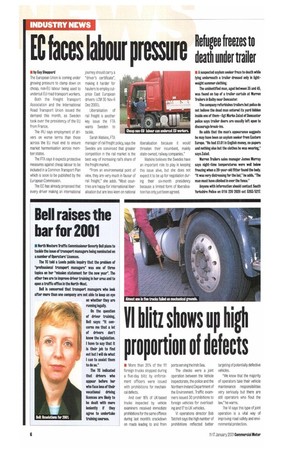EC faces labour pressure Rdeath e fu e u e n r e t z r e a s i l t e o r
Page 8

If you've noticed an error in this article please click here to report it so we can fix it.
• by Guy Sheppard The European Union is coming under growing pressure to clamp down on cheap, non-EU labour being used to undercut EU road transport workers.
Both the Freight Transport Associab on and the International Road Transport Union issued the demand this month, as Sweden took over the presidency of the EU from France.
The IRU says employment of drivers on worse terms than those across the EU must end to ensure market harmonisation across member states.
The FTA says it expects protective measures against cheap labour to be included in a Common Transport Plan which is soon to be published by the European Commission.
The EC has already proposed that every driver making an international
journey should carry a "driver's certificate", making it harder for hauliers to employ cutprice East European drivers (CM 30 Nov-6 Dec 2000).
Liberalisation of rail freight is another key issue the FTA wants Sweden to tackle.
Sarah Watkins, FA manager of rail freight policy, says the Swedes are convinced that greater competition in the rail market is the best way of increasing rail's share of the freight market.
"From an environmental point of view, they are very much in favour of rail freight," she adds. 'Most countries are happy for international liberalisation but are less keen on national liberalisation because it would threaten their incumbent, mainly state-owned, railway companies.'
Watkins believes the Swedes have an important role to play in keeping this issue alive, but she does not expect it to be up for negotiation during their six-month presidency because a limited form of liberalisation has only just been agreed.
































































































